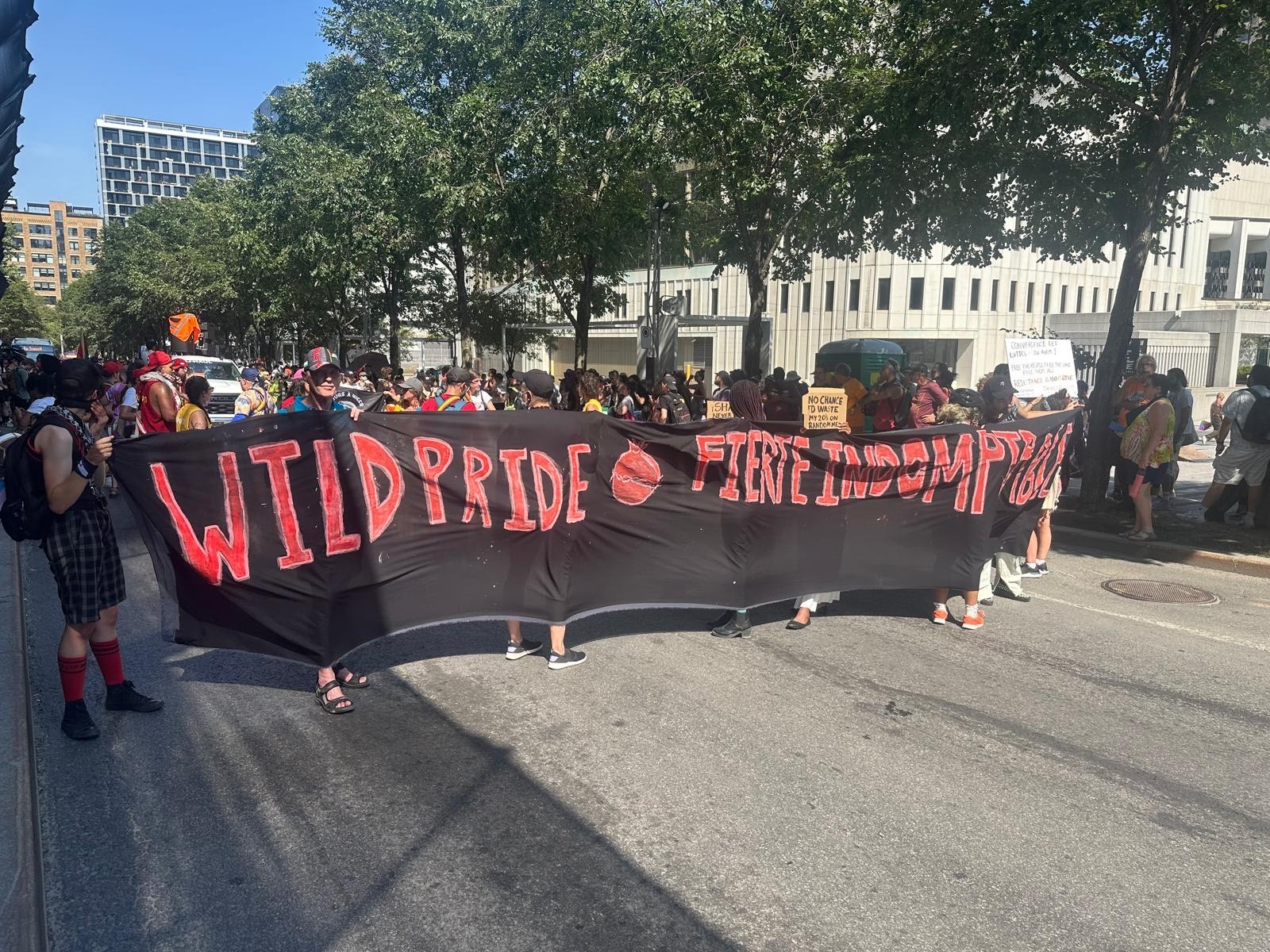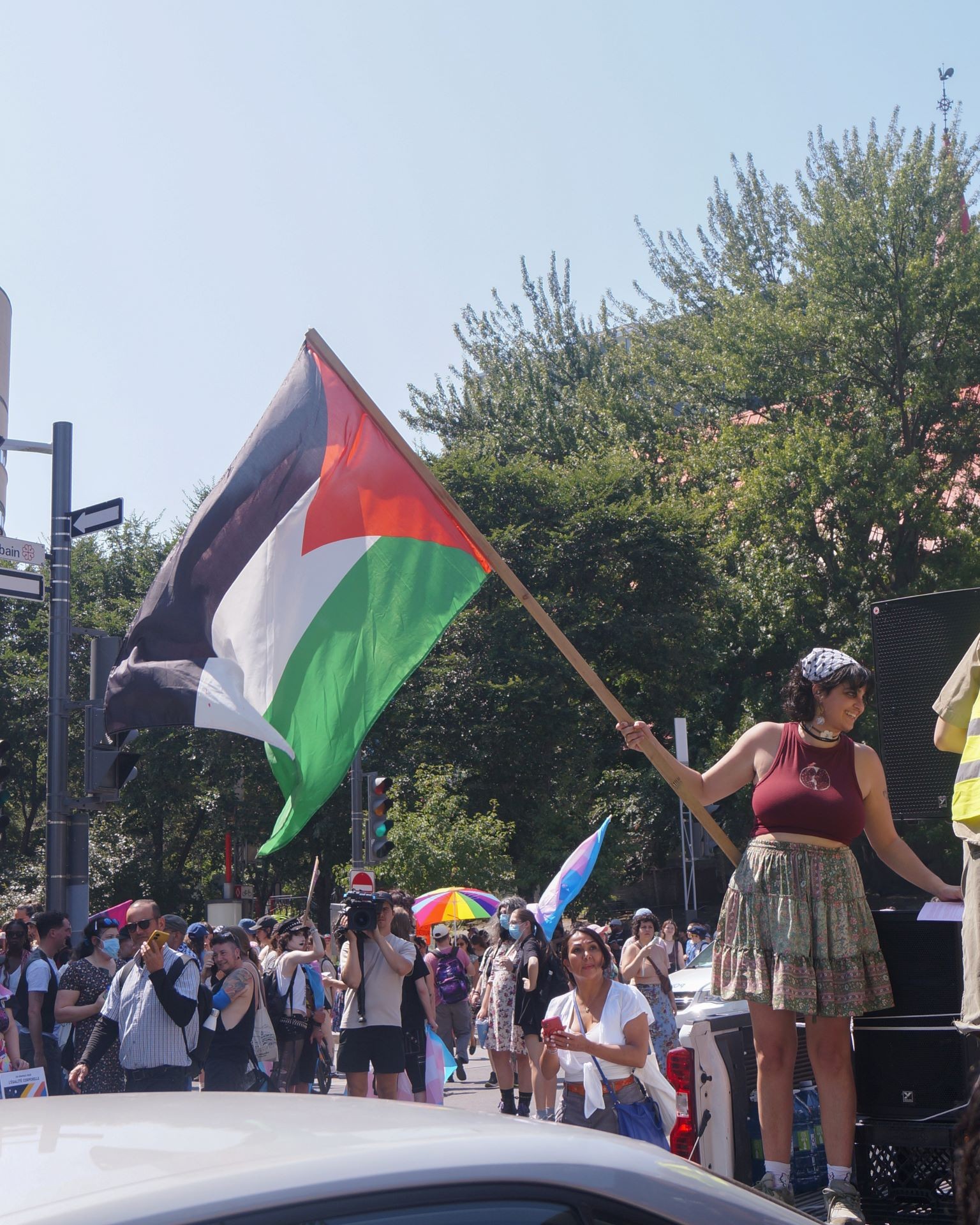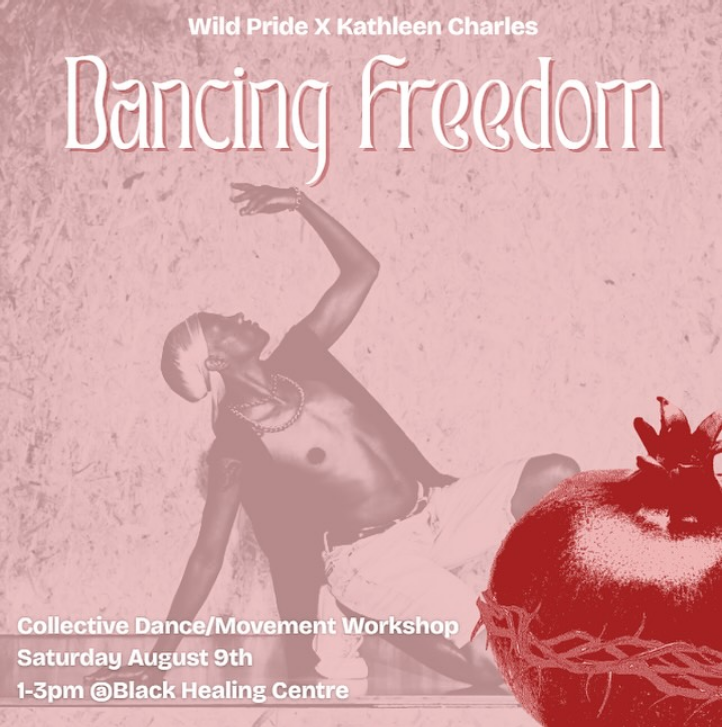Wild Pride: building alternative, grassroots spaces
with Yara Coussa
 Wild Pride march, August 10th 2025
Wild Pride march, August 10th 2025
As part our August 2025 Journal theme "Confronting Pride", SHIFT interviewed Yara Coussa, co-coordinator of Wild Pride, about what it was like to organize a brand new festival focused on building communities of resistance and multiplicity.
Tell us about yourself, and the birth of Wild Pride
I’m Yara (they/them), one of the co-organizers of Wild Pride. In my actual job I do intervention work and also work at l’Eugelionne, where Wild Pride has hosted a lot of events.
Wild Pride sort of started on a group chat with a bunch of different people. Aisha, Samya and I had a little thought about organizing our own pride event that doesn’t feel shitty, where there’s no ethical compromise – if we did something for us and by us, and presented young queer people with that option. A week later we had made a spreadsheet and started reaching out to community organizations, first with Shannon from l’Asterisk.
It really started with the three of us sitting on my porch asking ourselves if we could even do this. But we were cautiously optimistic, and we did a townhall in May 2025 to see if there was interest. We thought, if no one shows up then we’ll just let it go, but over 150 people showed up and all said they wanted to be involved. It blossomed from there: now there’s a collective of about 20-30 people organizing at different levels, including committees on finance, accessibility and inclusion, politics, merch, and programming.
I've been organizing in MTL’s queer community for a while now, and I would say the people involved in Wild Pride is probably the most “diverse” group I’ve encountered. Likely not highly diverse politically (as everyone’s left leaning), but diverse in life paths. And the programming is a reflection of who we are: there’s Black only events, SWANA (Southwest Asia and North Africa) events, parents events – all organized by and for.
Our programming was intentionally messy, everything for everyone – you'll find people who go to one event wouldn’t go to another. It's meant to speak to our whole community.
Why did you start a festival separate from Fierté Montreal?
We have a lot of anger towards Fierté that we had to ... not de-escalate, but sit down and unpack. It’s been such a disappointment, we’ve had “telephone cassé” [broken telephone] conversations with them, where they say they don’t want to talk about geopolitics but then they talk about things happening in the United States. It’s crazy when you’re willing to talk about geopolitics when it’s not exclusively affecting Black and Brown bodies. I’ve been disappointed by the overt racism, you know? We’ve had conversations with a Fierté Board member who said they didn’t want to see Palestinian flags at queer protests anymore, saying “Can’t you save them for your protests?” - they weren’t even trying to understand.
What they’ve done is disassociate queer issues from anything else in the world is so harmful – saying “this is not our fight” yes of course it’s our fight! It’s only a matter of time before capitalism fully rejects queerness, and they’ll look and feel stupid. Capitalism has never been there for us. TD Bank [a major sponsor of Pride events in Canada], for example, funds US prisons, has dispossessed Indigenous people in Canada, has harmed trans people here. They are not a good entity. They just rainbow wash themselves by funding Fierté, and Fierté is enabling this virtue signalling, and that’s so harmful.
I want to add that, there's also this weird thing in interviews that’s almost a Black erasure– because I was talking about Sudan and Congo in interviews, but people were only ever saying that I talked about Palestine.
What makes Wild Pride different, then?
Wild Pride uses a very bottom-up approach, it’s really grassroots, with people planning their own programming. For most of the events we’ve only provided logistical support, but we haven’t provided input: the only input is for events of a certain size and making them mask mandatory. Otherwise, we just let people do what they wanted and highlight the things they were already doing. Our programming was intentionally messy, everything for everyone – you'll find people who go to one event wouldn’t go to another. It's meant to speak to our whole community.
That’s the reason our visual is a pomegranate: when you open it up there’s “little bits of everything,” not a monolith. We don’t agree on everything, there are multiple queer communities and that’s what we’re trying to showcase.
 Photo credit: Wild Pride
Photo credit: Wild Pride
Have there been in challenges in organizing so many people doing different things?
We've tried as much as possible to make the organizing committees horizontal. In practice it’s much harder to do that because people’s capacities are different. 30% of my work has been managing different personalities: I’m very anti-punitive and grew up that way, but sometimes you do need to call people in, and that’s been hard. My mother was worried the right was going to come for me, but I was like no it’s the left that’s going to cancel me! Haha.
The other challenge was money, because we had a $0 budget. By our estimate we thought we’d need $12k. We reached out to a few groups like the CSN and a few queer community orgs that had said they don’t want to work with Fierté anymore but had a budget for annual Fierté events. We organized a carwash where we raised like $5000, and we donated half of it to Kuffiyeh for Direct Action because resource distribution and mutual aid is a big part of what we believe in.
These are all connections we had before too, and it’s because we’re part of the community or our members are part of those organizations. We already knew all these people, so it wasn’t hard to build up a network to make Wild Pride happen.
Montreal has a pretty strong history of anti- or alternative Pride festival organizing, thinking specifically of past event series’ like PerversCité. How do you see Wild Pride fitting into that lineage? Where have you perhaps pulled inspiration from in your organizing?
Thank you for asking that question. We definitely pulled inspiration from PerversCité, and I keep bringing up Rad Pride, Brûlances, and Constellation as well. There’s been anti-Pride things for years. We really inspired ourselves from them, and many of our members are members of other groups too like Pink Bloc. I sought a lot of guidance from Brûlances organizers when it came to infighting or dealing with some of our challenges.
We're so grateful for these events because they paved the way. I think the only reason we’re getting media attention is the time we’re in right now, we’re using the word “Pride”, and we’re positioning ourselves in competition and in comparison. Of course, Fierté Montreal is going to be bigger and fancier - they have a budget of $7m, we have 9000$ operating budget - but we want to offer people an alternative.
 Poster from a Wild Pride event called "Dancing Freedom"
Poster from a Wild Pride event called "Dancing Freedom"
What has it been like partnering with grassroots organizations?
It's been essential. We have collaborations with Centre de Solidarité Lesbienne, l’Astérisk, Jeunesse Lambda, JuriTrans, AGIR, and more. They've been working in solidarity with us and even providing staff support: AGIR for example is donating three hours per employee to volunteer with us.
Something that also boosted us was the support from [event & nightlife organizers] Voulez Vous Productions, Sweet Like Honey, Messy, and Discono. They had come out saying that they wouldn’t collab with Fierté enymore, and they're collaborating with Wild Pride instead because of lesbophobic and unprofessional practices.
These are all connections we had before too, and it’s because we’re part of the community or our members are part of those organizations. We already knew all these people, so it wasn’t hard to build up a network to make Wild Pride happen.
I see that the Wild Pride events are also hosted at community spaces like Brique par Brique and the Black Healing Centre. What have those collaborations been like?
It’s lovely to work with groups that have their own spaces. We come in and adjust to them, how it works in their space, being grounded in how community spaces or organized instead of the other way around. A physical space to me is so important and it’s so sad that most groups don't have that, because with the groups that do, we can see how much more of a community they have and an identity they have. It's almost like the space is institutional memory, and it’s nice to be a part of that.
Last question. What do you want people to feel when they come to Wild Pride events? What experience do you want them to have?
I want people to feel represented. And more than that, I want them to feel community, that people feel held and cared for. If one person feels that way, then the whole festival and this whole experience was worth it. At the beginning I was like “I’ll commit 2 hours a week” and now I'm committing 30 hours a week ... I don’t have a life. But it’ll be worth it if we create the space that people need, where people feel good.
Wild Pride is running until August 18th, 2025, with events every day.



